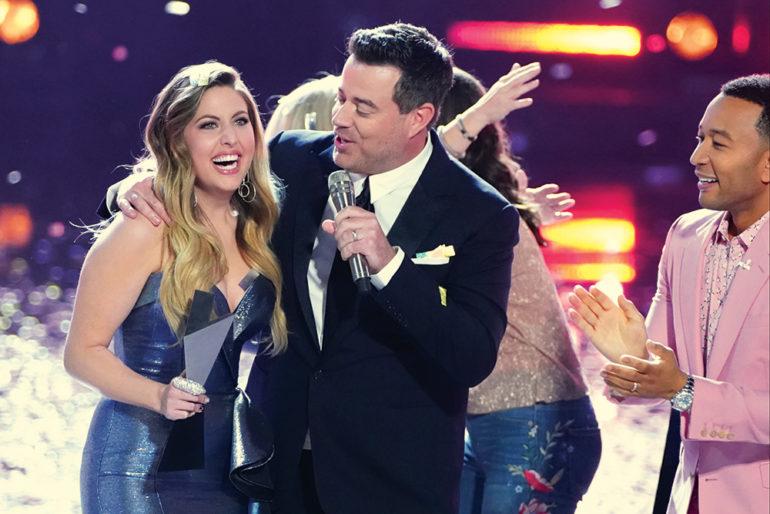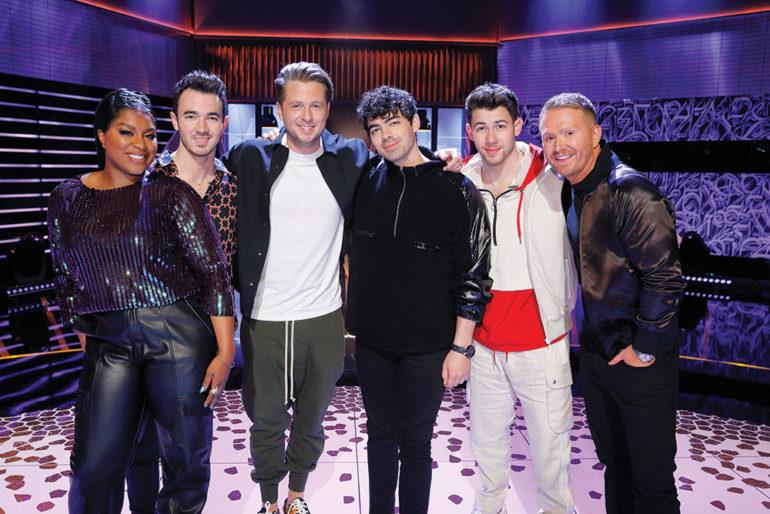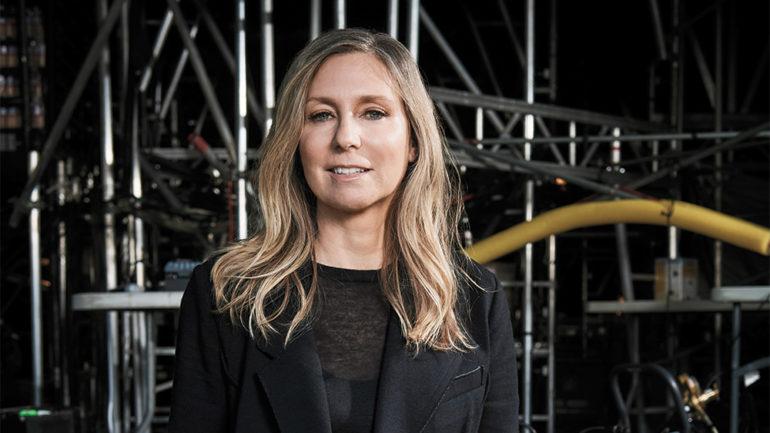‘Songland’ and ‘The Voice’ Showrunner Leads Surge of Women Producing Competition Shows
By Cynthia Littleton
LOS ANGELES (Variety.com) – Audrey Morrissey can’t stop the feeling.
The showrunner and executive producer of NBC’s “The Voice” spends most of her professional life thinking about songs. She thinks about the new and not-so-new tunes that should be in the repertoire of her hit singing-competition series. She thinks about how music can be a signpost for shifts in the culture. More than anything, she thinks about songs and artists and how to present them onstage for two very different sets of viewers at the same time: those in the studio audience and those watching on couches and beds and Barcaloungers at home.
Now, after a long run as a highly sought-after producer of concert specials, awards shows, live events and musical moments for the screen, Morrissey, 52, is getting her first shot at launching a series, which she co-created with famed songwriter-producer Dave Stewart and her husband and longtime collaborator, director Ivan Dudynsky. NBC’s “Songland,” a competition show revolving around budding songwriters, premieres May 28 for an 11-episode run.
“My entire career has been dealing with music on television and putting on big productions,” Morrissey says.
Morrissey’s ascent in the 1990s at MTV and during the past dozen years as she became a trusted lieutenant to über-producer Mark Burnett reflects a surge of women who have moved into the top ranks as producers of television’s biggest high-wire acts: reality-competition series with live-performance elements. This unpredictable, adrenaline-filled sector of the reality-TV business was once dominated by male producers. Not anymore.
“The landscape of all of these shows is really becoming different,” says Deena Katz, co-executive producer on ABC’s “Dancing With the Stars” since it began as a six-episode summer show for ABC in 2005.
“It was all men who sold the shows, and the showrunners were all men,” Katz says. “With tenacity and keeping your head down and doing the work, slowly women started to emerge more. I’m proud every time I see another female name out there as a creator or showrunner. There’s more of that in the world of scripted shows. In unscripted we’re finally getting our due as well.”
Like “Voice” and “DWTS,” ABC’s “American Idol,” Fox’s “The Masked Singer” and NBC’s “America’s Got Talent” are among the programs that feature female showrunners, executive producers or co-executive producers who are integral to the production. Some say they’re addicted to the excitement of going live without a net. Some say they love the challenge of helping an artist interpret a song for the TV cameras. Some excel at the storytelling required to introduce a competition hopeful to the audience. And some love the thrill of waiting for the chance to pounce on an unexpected moment.
Trish Kinane, executive producer and showrunner of “American Idol,” has long subscribed to the philosophy, “What’s the point of doing live TV if it doesn’t feel live?”
As an example, she points to the unplanned moment during the past season of “Idol” in which host Ryan Seacrest brought an ultra-enthusiastic fan from the audience onto the stage in order to tap into his excitement. “The whole point of being live is to break the routine a bit,” says Kinane, who is also president of entertainment for “Idol” producer Fremantle.
Kinane is a veteran producer and entrepreneur who has been active in independent TV production and sales since the late 1970s in her native Britain. But she had to move to South Africa for a year to break into TV production in 1976, mostly because there were so few openings at the time in the U.K. As she gained experience, she found the confidence to be a leader at a time when few women were working on sets and in executive suites.
“I learned early on you have to have the confidence to speak up and to lead people the way they want to be led,” Kinane says. “I have found if you are passionate about the show, people will want to come along with you in that.”
Izzie Pick-Ibarra had taken a short break from showrunning to focus on her children — she’s got four under the age of 10 — when she started to hunt around for a new program to lead. She was disappointed in her options until a bizarre property from Thailand came on her radar. “The Masked Singer” features celebrities who try to stump judges while performing songs in theme-park-like animal costumes.
“It was perfectly weird as hell, and I loved it,” Pick-Ibarra says. “I loved the theatrics and the visuals of the costumes and the aesthetic of this crazy show. I loved the idea of a game within a music-competition show — the need to have game-play clues and storytelling around that.”
The juggling act of producing a variety show is an adrenaline rush and a logistical challenge that requires military precision at times. Sam Donnelly, co-showrunner with Jason Raff of NBC’s “America’s Got Talent” and “America’s Got Talent: The Champions,” admits she’s drawn to the nuttiness of it all.
| “” champ Maelyn Jarmon celebrates with host Carson Daly and coach John Legend. The energy on screen translates to viewers at home, says showrunner . Tyler Golden/NBC |
On “AGT,” Donnelly notes, “every single act is different. You might have somebody who is potentially doing something super-dangerous onstage followed by a small child singer. It’s so fun. Half the time I just can’t believe it’s my job.”
Finding joy in the challenges of the task and having the ability to manage the seemingly impossible are common qualities among a number of prominent female unscripted producers.
Meredith Ahr, president of NBC’s Alternative and Reality Group, says Morrissey is the rare producer who is adept at delivering both live spectacle and intimate moments. “Audrey is an executive producer and creative you want with you in the trenches,” Ahr says. “She’s incredibly thoughtful and surgical with her approach to programming while still managing to infuse heart into her storytelling.”
Morrissey grew up in Wilton, Conn., in a family that was about as unconnected to the entertainment industry as any could be. “It was just foreign to me,” she recalls. As a kid, she loved a wide range of music and tried her hand at numerous instruments. She was a music minor (and English major) at Colgate University in upstate New York in the late 1980s, training that she credits with helping her “converse with the music side of the business.”
She set her sights on working in the music biz after graduation in 1989, trying to get her foot in the door with a job at a record label, but it was not meant to be. A friend and fellow Colgate graduate referred her to another alum, Douglas Wilson, who was working at MTV. He gave her an entry-level production job that set her on a career path that blended two of her favorite things: music and television.
“I was fortunate enough to be assigned to the series and specials team, which basically meant I worked on any of the major music or event specials,” such as the Video Music Awards and the “Unplugged” series, Morrissey says. She’s grateful for the luck of getting to learn her craft in the fertile creative environment of MTV in the 1990s.
“MTV was thriving and growing, and the opportunities seemed boundless,” she recalls. “Young people were given responsibilities way beyond what they would have gotten elsewhere. It was ‘Run, do not walk. Let’s do this.’ No idea was a bad idea. They were into trying things.”
Another notable quality of MTV in that era was the high number of women in leadership roles. “All of my bosses were women,” Morrissey says, citing longtime leader Judy McGrath and others. “It was almost like we were in this little bubble with no concept of the glass ceiling. We had great role models and mentors. We were such a young network even when I got there.”
Morrissey quickly climbed the ranks as a line producer and producer as she demonstrated her natural skill at organizing and juggling all the elements of an elaborate live production. As she gained more responsibility, she found she most enjoyed the process of helping musical artists make a visual statement.
“The most successful performances are the ones where you’re working in close partnership with the artists and you’re doing everything you can to bring their vision to life,” Morrissey says. “It basically comes down to the artist being true to themselves and knowing how they want to express themselves.”
When performances are truly live, it’s the producer’s challenge to make the presentation succeed for the studio audience and for viewers at home. It takes a small army of experts and technical whizzes to get it all to come together on the first — and only — take.
“If one of your audiences is neglected or not having a really robust experience, it doesn’t work,” Morrissey says. “You need the people in the room to be engaged and connected. That energy translates on screen to viewers at home. You have to work with your director to shoot it in the right way to give you the specific shots you want. You have to look to your lighting director, your special effects director. The stars themselves are working so hard. You have to bring all these little details together as a unit.”
Morrissey moved on from MTV by the late 1990s to work with music moguls Jimmy Iovine and Doug Morris as the executive producer of the music-centric series “Farmclub,” which ran in late night on USA Network from early 2000 to mid-2001. The show was part of the web venture that Iovine and Morris launched to scout out new talent for Iovine’s Interscope Records during the turbulent period when Napster’s arrival signaled the beginning of the digital era for the music biz.
| Mentors Ester Dean, Ryan Tedder (third from left) and Shane McAnally (far right) join guest performers the Jonas Brothers for an episode of “.” Trae Patton/NBC |
After “Farmclub” ended, Morrissey launched her own shingle, Live Animals. By that time, many of her former MTV colleagues were running cable channels in the U.S. and abroad. Live Animals had a busy run producing events and awards shows for MTV and other outlets.
In 2007, when MTV executives decided to inject more pizazz into the MTV Movie Awards, the cabler hired Burnett, who was red-hot with the success of CBS’ “Survivor” and NBC’s “The Apprentice.” But he’d never produced an awards show, so MTV suggested he team with Morrissey.
Burnett found Morrissey to be an “amazing” producer within minutes of their first meeting. The two wound up partnered on four MTV Movie Awards telecasts, plus multiple editions of the People’s Choice Awards and the 2011 Emmy Awards. Burnett and Morrissey were developing music competition concepts for NBC when the Peacock found the “Voice” format airing in the Netherlands. The pairing of Burnett and Morrissey gave NBC the confidence to strongly support the show that sparked the network’s turnaround in 2011.
“Audrey is always that person who rolls up her sleeves and is completely, completely hands on,” Burnett says. “On live shows, she’s got her headset on in the truck, always taking us down to getting off the air at the right second every time. She’s a dynamic leader, and she leads with integrity and kindness.”
“Songland” began as a concept that Stewart, of Eurythmics fame, kicked around in his head for years. He wanted to find a vehicle to put the spotlight on songwriters. “I saw that the whole world had become singing contests, but you never really knew what goes into the writing of a great song.”
Stewart had worked with another producer on and off but was frustrated that the idea wasn’t coming to fruition. He and Morrissey’s mutual representatives at ICM Partners suggested they meet.
“Meeting Audrey was like somebody switching on a lighthouse,” Stewart says. “She is so brilliant. I could see her brain going a million miles an hour. We got on like a house afire.”
It still took the pair nearly five years to shepherd the concept to a series order at NBC. There was much tweaking and shaping of the “Songland” format along the way. Stewart was impressed at how Morrissey rolled with the changes, all the while piloting two editions of “Voice” every year. “She works her ass off,” Stewart says.
“Songland” features three top songwriter-producers — One Republic singer Ryan Tedder, Shane McAnally and Ester Dean — who work as mentors to three budding songwriters to help them shape a piece for each episode’s guest star. The guest commits to recording the song, which is released digitally at the conclusion of each episode. John Legend, who works closely with Morrissey as a coach on “The Voice,” effortlessly demonstrates his range, musical dexterity and generosity as the guest artist in the opening “Songland” installment.
If “Songland” is successful, the show could make a mint in international format sales for NBCUniversal. Morrissey feels it has potential to connect with music lovers on a deep level.
“It’s riveting to see how a small lyric change or small change to the music just seems like some kind of magic or sorcery,” she says. “You’re literally watching in real time how inspiration strikes. You can’t believe how they’re just like vessels for the music to come out of their bodies somehow. It’s fascinating to watch.”
She also believes “Songland” sends a broader, more hopeful message to viewers about communication and sharing. The show features diverse pairings such as a first-episode team-up of prominent country songwriter-producer McAnally with a young woman from the Bahamas with R&B sensibilities.
“Songwriting is a collaborative process,” Morrissey says. “I want the audience to see what it’s like to have creative people harmoniously collaborate for the greater good of trying to create a great song. I think having examples in media of positive collaboration is great — I think we can use as many of those examples as possible. I feel in some ways ‘Songland’ might be one of the most important projects I’ve worked on in my career.”



